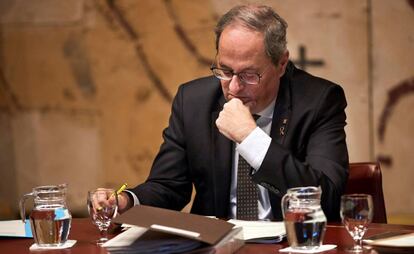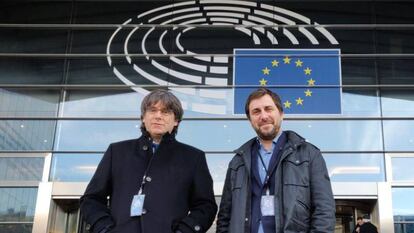PM, Catalan premier agree to meet to lay out groundwork for Catalonia talks
A day after being sworn back into office, Pedro Sánchez calls Quim Torra and states that he has “the sincere will to try to sort out the political conflict” in the northeastern Spanish region

Spain’s Prime Minister Pedro Sánchez and Catalan Premier Quim Torra had a telephone conversation at 9.30am on Thursday in which they agreed to hold a meeting following the formation of a new government in Spain.
Together for Catalonia has always insisted on bringing an outside observer to the table
Sources at La Moncloa, the seat of Spanish government, said that Sánchez told the separatist leader that he has “the sincere will to try to sort out the political conflict in Catalonia.” The seven-minute conversation was described as cordial by these sources.
The conversation is relevant because it breathes new life into a relationship that had suffered badly after the Supreme Court ruling that sentenced leaders of the 2017 failed breakaway bid in the northeastern Spanish region to lengthy prison sentences for sedition and misuse of public funds.
The October ruling was followed by widespread street rioting in Catalonia and Sánchez decided to isolate Torra, refusing to take his calls until the latter openly condemned the street violence by separatist activists.
Searching for a date
On Wednesday, the spokesperson for the Catalan government, Meritxell Budó, said that Torra’s and Sánchez’s teams were searching for a date for a possible meeting between both men. Budó added that this meeting would serve to establish “the details and conditions” of the talks that are scheduled to take place between the central and Catalan governments over the situation in Catalonia.
Although Sánchez’s Socialist Party (PSOE) and the Catalan Republican Left (ERC) have already signed a document laying out guidelines for the talks, some of the conditions could change. Together for Catalonia (JxCat), another separatist party whose best-known member is former Catalan premier Carles Puigdemont, has always insisted on bringing an outside observer to the table. The PSOE-ERC deal does not include such a figure, but Budó on Wednesday said that Torra could potentially make this a demand.
Torra’s own political future is on the line after the Catalan Regional High Court found him guilty of disobedience
Sánchez on Tuesday obtained parliamentary endorsement for his proposed government after securing a pledge of abstention at the investiture vote from ERC, in exchange for a promise to start holding talks two weeks after the new executive is up and running.
Torra’s team has also begun contacting various leaders of the independence movement in order to bring a unified proposal to the meetings with the central government.
Torra’s own political future is on the line after the Catalan Regional High Court found him guilty of disobedience for refusing to remove pro-independence banners from public buildings during an election campaign, which violated regulations on political neutrality. The ruling, which disqualified him from office for 18 months, is not definitive until the Supreme Court issues a decision on Torra’s appeal.
Catalan politicians could receive as much as €70,000 in back-pay from the European Parliament

The Catalan politicians Oriol Junqueras, Carles Puigdemont and Toni Comín all ran as candidates in last year's European elections, and were successfully elected as MEPs. But given their legal issues, there has been an ongoing battle since then for them to take their seats.
All three were key figures in the 2017 independence drive in the northeastern Spanish region, and were sacked when the central government in Madrid took control of Catalonia's regional powers under Article 155 of the Constitution. Puigdemont, Comín and several other politicians fled Spain to avoid arrest, while Junqueras and 12 other pro-independence leaders faced trial in the Supreme Court. Junqueras was sentenced to 13 years in jail for sedition and misuse of funds, while Puigdemont and Comín are still sought by the Spanish authorities to face trial.
In December of last year, the Court of Justice of the European Union (CJEU) ruled that Junqueras became an MEP as soon as he was elected on May 26, and should have enjoyed parliamentary immunity from that moment on. But he was unable to be sworn in, neither in Spain nor at the European Parliament, given that at the time he was in preventive custody in Soto del Real prison in Madrid ahead of the conclusion of the Supreme Court trial.
The ruling from the European court has not just allowed Puigdemont and Comín to access the European Parliament as fully fledged MEPs, giving them immunity to prosecution as well as a powerful voice in the media. Both of the politicians will also see their bank balances grow considerably in the space of just a few weeks.
Sources from the administration department at the European Union have confirmed to EL PAÍS that the Catalan politicians will be receiving the salaries and allowances that they would have been paid since July 2, the day when the current political term began in the European Parliament.
The net monthly salary of an MEP is € 6,824.85, while their allowances – to cover costs such as office hire, phones, IT equipment and conference rooms – total €4,513 a month. Having spent six months as MEPs-elect but without being able to receive these funds, given their legal problems, the pair can expect to receive around €70,000 – or as much as €80,000 should they also receive their January pay packet at the same time.
Junqueras could also receive the same amount, although his case is still pending a ruling by the Spanish Supreme Court on whether or not he is able to take on his role as MEP.
English version by Susana Urra and Simon Hunter.
Tu suscripción se está usando en otro dispositivo
¿Quieres añadir otro usuario a tu suscripción?
Si continúas leyendo en este dispositivo, no se podrá leer en el otro.
FlechaTu suscripción se está usando en otro dispositivo y solo puedes acceder a EL PAÍS desde un dispositivo a la vez.
Si quieres compartir tu cuenta, cambia tu suscripción a la modalidad Premium, así podrás añadir otro usuario. Cada uno accederá con su propia cuenta de email, lo que os permitirá personalizar vuestra experiencia en EL PAÍS.
¿Tienes una suscripción de empresa? Accede aquí para contratar más cuentas.
En el caso de no saber quién está usando tu cuenta, te recomendamos cambiar tu contraseña aquí.
Si decides continuar compartiendo tu cuenta, este mensaje se mostrará en tu dispositivo y en el de la otra persona que está usando tu cuenta de forma indefinida, afectando a tu experiencia de lectura. Puedes consultar aquí los términos y condiciones de la suscripción digital.








































